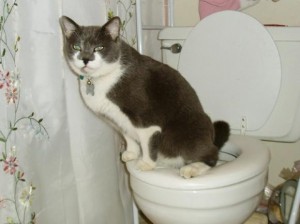Avoid Flush Cat Poop Down Your Toilet - Maintain Your Home's Plumbing System
Avoid Flush Cat Poop Down Your Toilet - Maintain Your Home's Plumbing System
Blog Article
The publisher is making several great points regarding Can You Flush Cat Poo or Litter Down the Toilet? as a whole in the article just below.

Introduction
As cat owners, it's necessary to be mindful of how we get rid of our feline good friends' waste. While it may seem convenient to purge feline poop down the bathroom, this practice can have destructive repercussions for both the atmosphere and human health.
Alternatives to Flushing
The good news is, there are much safer and more liable ways to take care of feline poop. Consider the complying with alternatives:
1. Scoop and Dispose in Trash
The most usual method of disposing of feline poop is to scoop it right into a biodegradable bag and throw it in the garbage. Make certain to utilize a dedicated trash inside story and take care of the waste quickly.
2. Use Biodegradable Litter
Select naturally degradable pet cat trash made from products such as corn or wheat. These litters are eco-friendly and can be securely gotten rid of in the trash.
3. Hide in the Yard
If you have a yard, think about burying feline waste in a designated location far from veggie gardens and water sources. Make sure to dig deep adequate to prevent contamination of groundwater.
4. Install a Pet Waste Disposal System
Buy a pet dog garbage disposal system particularly designed for pet cat waste. These systems utilize enzymes to break down the waste, reducing smell and environmental influence.
Health and wellness Risks
Along with environmental problems, flushing pet cat waste can also present health dangers to human beings. Cat feces may have Toxoplasma gondii, a parasite that can trigger toxoplasmosis-- a possibly extreme disease, especially for expectant females and individuals with weakened immune systems.
Environmental Impact
Flushing feline poop presents harmful pathogens and parasites into the water system, posing a substantial risk to water communities. These contaminants can adversely influence aquatic life and concession water top quality.
Conclusion
Accountable animal ownership prolongs past offering food and sanctuary-- it likewise involves appropriate waste administration. By avoiding purging feline poop down the toilet and selecting alternate disposal techniques, we can reduce our environmental footprint and safeguard human health.
Why Can’t I Flush Cat Poop?
It Spreads a Parasite
Cats are frequently infected with a parasite called toxoplasma gondii. The parasite causes an infection called toxoplasmosis. It is usually harmless to cats. The parasite only uses cat poop as a host for its eggs. Otherwise, the cat’s immune system usually keeps the infection at low enough levels to maintain its own health. But it does not stop the develop of eggs. These eggs are tiny and surprisingly tough. They may survive for a year before they begin to grow. But that’s the problem.
Our wastewater system is not designed to deal with toxoplasmosis eggs. Instead, most eggs will flush from your toilet into sewers and wastewater management plants. After the sewage is treated for many other harmful things in it, it is typically released into local rivers, lakes, or oceans. Here, the toxoplasmosis eggs can find new hosts, including starfish, crabs, otters, and many other wildlife. For many, this is a significant risk to their health. Toxoplasmosis can also end up infecting water sources that are important for agriculture, which means our deer, pigs, and sheep can get infected too.
Is There Risk to Humans?
There can be a risk to human life from flushing cat poop down the toilet. If you do so, the parasites from your cat’s poop can end up in shellfish, game animals, or livestock. If this meat is then served raw or undercooked, the people who eat it can get sick.
In fact, according to the CDC, 40 million people in the United States are infected with toxoplasma gondii. They get it from exposure to infected seafood, or from some kind of cat poop contamination, like drinking from a stream that is contaminated or touching anything that has come into contact with cat poop. That includes just cleaning a cat litter box.
Most people who get infected with these parasites will not develop any symptoms. However, for pregnant women or for those with compromised immune systems, the parasite can cause severe health problems.
How to Handle Cat Poop
The best way to handle cat poop is actually to clean the box more often. The eggs that the parasite sheds will not become active until one to five days after the cat poops. That means that if you clean daily, you’re much less likely to come into direct contact with infectious eggs.
That said, always dispose of cat poop in the garbage and not down the toilet. Wash your hands before and after you clean the litter box, and bring the bag of poop right outside to your garbage bins.
https://trenchlesssolutionsusa.com/why-cant-i-flush-cat-poop/

I was shown that editorial on How to Dispose of Cat Poop and Litter Without Plastic Bags from a good friend on our other web blog. Loved our article? Please share it. Let someone else discover it. Thanks for your time invested reading it.
Call Today Report this page